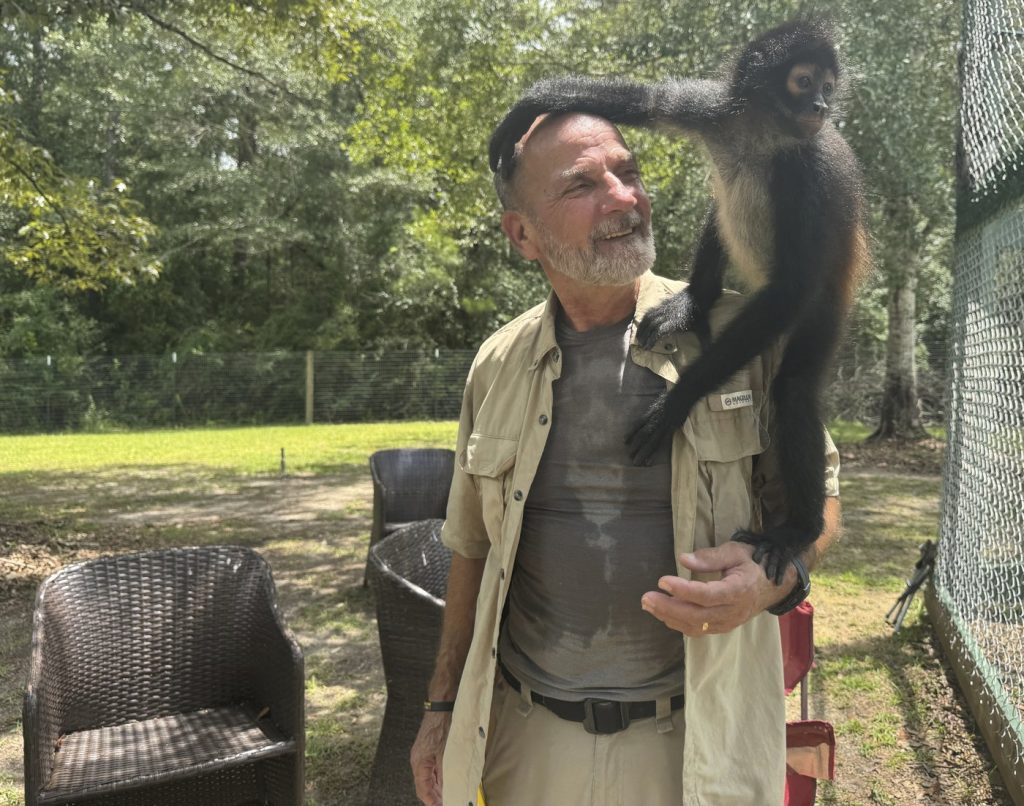PERKINSTON, Miss. (AP) — In the scenic surroundings of the Gulf Coast Primate Sanctuary in rural southeast Mississippi, an Army veteran named John Richard found solace with a spider monkey named Louie. After struggling with post-traumatic stress disorder (PTSD) for over 20 years, Richard expressed that his bond with Louie has brought him a profound sense of peace. “Being out here has brought a lot of faith back to me,” Richard stated, emphasizing the deep emotional connection he has formed with the primate.
The unique bond began when Richard volunteered to help two fellow veterans set up the sanctuary last fall. During a recent visit, Louie eagerly scampered up Richard’s body and embraced him with his arms and tail, creating a heartwarming scene of friendship. Richard shared that Louie's gentle sounds and physical closeness made him feel reassured, saying, “I know you’re OK. I know you’re not going to hurt me.” He believes that the connection with Louie has provided more healing than any of the treatments he has pursued for his PTSD.
April Stewart, the Air Force veteran who founded the Gulf Coast Primate Sanctuary, echoes a similar sentiment regarding her experience with PTSD, which she developed as a result of military sexual trauma. Preceding her work with primates, she described her struggles as a consuming cancer, and she credits her love of animals as a therapeutic outlet. Though she did not initially intend for the sanctuary to serve as a healing space for veterans, it has evolved into a place of mutual healing and trust-building, not only for the primates but for the volunteers as well.
Stewart’s sanctuary, set on 15 acres of land, is home to various animals including rescue dogs, noisy geese, and a black cat, in addition to several primates like spider monkeys, squirrel monkeys, and kinkajous, which are closely related to raccoons. The sanctuary features spacious enclosures, each complete with air-conditioned areas and large outdoor zones where the primates can swing and play. The care for these animals is a day-long commitment for Stewart, as she diligently checks on them every morning and evening.
The success of the sanctuary relies heavily on the help of volunteers, many of whom are veterans themselves, showcasing a collaborative effort in providing care for the animals. Stewart hopes to expand the sanctuary’s outreach by opening it to the public for guided educational tours next summer. Since its inception in October, after initially rescuing and rehoming monkeys, the sanctuary has garnered support from exotic-animal veterinarians who ensure the primates are well cared for and that the facility meets necessary regulations.
Notably, the Gulf Coast Primate Sanctuary is the only primate sanctuary in Mississippi licensed by the U.S. Department of Agriculture. Stewart emphasizes that primates make difficult pets due to their social and spatial needs, which often cannot be met in a home setting. The sanctuary’s primary goal is to offer the animals a natural habitat and to foster social connections among their species, helping them form families amongst themselves.
As the sanctuary continues to grow, the stories of healing and connection for both veterans like Richard and the animals they care for reflect a poignant narrative of resilience and hope. “This is their family,” Stewart expresses, reinforcing her commitment to providing a nurturing environment for the animals and a therapeutic space for those who serve the sanctuary.











